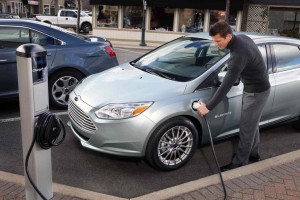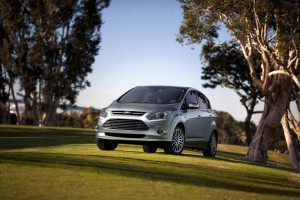Clearly concerned by the controversy that’s erupted over fires involving the Chevrolet Volt’s lithium-ion batteries, Ford Motor Co. officials pointedly stressed that they have gone to extremes to ensure there won’t be problems when they launch an array of lithium-powered products in the coming year.
Ford provided an inside look at their “electrified” line-up today, a mix of hybrids, plug-in hybrids and pure battery-electric vehicles, or BEVs, that the maker hopes will position it as one of the leaders in the growing green automotive niche.
“The goal is to focus on affordable, sustainable technologies, not for 100s of customers or thousands, but for millions,” said Derrick Kuzak, Ford’s global product development chief, who added that the maker “will triple the production capacity for electrified vehicles to 100,000 by 2013.”
But there’s the potential rub. Like most of its competitors, Ford is migrating away from older nickel-metal hydride batteries to more advanced lithium-ion technology, which uses about a third less space and weighs half as much. But lithium chemistry is more volatile – indeed, the FAA has put severe restrictions on the shipping of LIon batteries by air.
General Motors is now embroiled in a controversy triggered by two fires that occurred weeks after the National Highway Traffic Safety Administration crash-tested the Chevy Volt. It is unclear why the fires occurred though it appears the incidents were linked to leaks in the glycol cooling system used to maintain a steady temperature for the batteries, lithium operating at peak efficiency around 70 degrees Fahrenheit.
So far, no fires have occurred in real-world use and both the NHTSA and the Insurance Institute for Highway Safety have maintained the Volt is safe but the headline-making fires have impacted sales and the controversy threatens to spill over to other makers using lithium.
Ford is in a potentially vulnerable spot because it sources its batteries from the same Korean-based supplier, LG Chem. But the basic cells are only part of the package, emphasized Kuzak, noting that Ford builds its own battery pack and uses a unique design different from GM’s. In testing, to date, he indicated, there have been non instances where the steel-shielded pack has been penetrated during a crash simulation.
“We’re absolutely confident of the safety of the battery,” Kuzak declared during an interview at the maker’s Michigan Assembly Plant, in the Detroit suburb f Wayne.
That factory produces the conventional Ford focus model, and recently added the new Focus Electric, 100 of the battery cars rolling out this month for shipment to California dealers. Higher-volume production will begin early in 2012.
Ford officials, during a briefing on their battery car plans, noted the Focus Electric will get about 100 miles range per charge and is expected to get an EPA fuel economy rating of the equivalent of more than 100 miles per gallon, or MPGe. Those numbers would put it well ahead of the Nissan Leaf.
Ford also expects to out-do both the Chevy Volt and Toyota Prius Plug-in Hybrid when it launches its own plug-in next year, the C-Max Energi. Preliminary data suggest the people move will get an average of more than 40 MPG on gas alone, and a full 500 miles using both its battery and gas drivelines. Precise range on battery alone has yet to be released.
Ford also plans a more conventional hybrid version of the C-Max, its first model to be sold only in battery form, either as a hybrid or plug-in.
Pricing for the two C-Max variants has not been released, though the Focus Electric will come in at $32,495 after a $7,500 federal tax credit. To take advantage of the compact model’s high-speed 6.6 kilowatt-hour charger – which cuts charging time to as little as 3 hours – buyers will have to invest another $1,499 for the special 220-volt wall-mounted unit. Notably, the charger can be readily removed and taking to a new home should an owner move.
The cost of battery technology is clearly a challenging for Ford — and–its competitors – but something that can’t be avoided with such new technology, said Kuzak,
But as with today’s consumer electronics, he predicted that the cost-volume curve favors consumers and “the expectation is, over time, costs will go down.”


